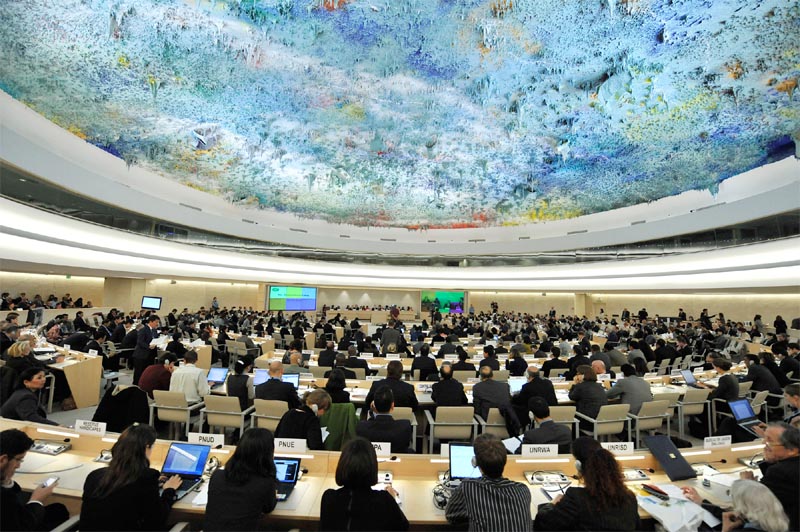 Dharamshala: The ongoing UN Human Rights Council's 16th plenary session has been apprised on the grave challenges faced by the Tibetan people inside Tibet under the wrong policies of the Chinese government.
Dharamshala: The ongoing UN Human Rights Council's 16th plenary session has been apprised on the grave challenges faced by the Tibetan people inside Tibet under the wrong policies of the Chinese government.
Mr Tenzin Samphel Kayta, on behalf of the Society for Threatened Peoples, made a statement today on the deteriorating human rights situation in Tibet, including the government policies which threaten the survival of Tibet's traditional nomadic herders.
Mr Kayta informed the UNHRC that the Chinese security have inflicted great suffering on Tibetans since their peaceful protests against the government's wrong policies. "Tibetans have suffered immensely from Chinese security forces crackdown - extrajudicial killings, arbitrary detentions, secret detentions, enforced disappearances, torture and custodial deaths, denial of legal rights and lack of the independence of the judiciary and harsh sentences," he said.
The Tibetans also suffer death penalty and intensified crackdown on spiritual teachers, human rights defenders, environmentalists, writers, intellectuals, artists and Tibetan entrepreneurs, he added.
He further informed that council that since March 2008 protest, two Tibetans were executed and five political prisoners had been given death sentence with 2-year reprieve by a Chinese court.
"According to Tibetan sources, there are 831 known political prisoners of conscience as of 30 December 2010. Out of which, 360 were known to have been legally convicted by the Chinese courts. Furthermore, 12 Tibetans were serving life imprisonment term. In 2010, 188 known Tibetans have been arrested and detained, out of which 71 have already been sentenced by the courts," he said.
"These tragic realities confronted by the Tibetan people is a direct result of China's slogan of "people's war" to suppress the uprising. Today, the Chinese authorities do not tolerate any expression of Tibetan aspiration. The reality of President Hu Jintao's "harmonious society" for Tibetans is a climate of fear, intimidation, domination and repression," he added.
Mr Kayta also voiced deep concern over the Chinese government policies impacting the livelihoods of Tibetan nomadic herders.
"On 3 October 2007 three special procedure mandate holders of this Council intervened the Chinese government's policy of relocating Tibetan nomads and herders - "these policies have had a very adverse impact on the traditional lifestyles and living patterns in Tibetan areas, affecting directly the fabric of traditional Tibetan life and devastating the economy of these communities. The implementation of these policies contributes to the challenges that Tibetan cultural and religious identity face today." So far Chinese government had forcibly relocated 1.43 millions Tibetan nomads and herders from their ancestral land devoid of proper consultation," he said.
He apprised the council about how the Chinese government regulates their "legal system" to become the "authority" of the reincarnation process of Tibetan Buddhism.
"The communist cadres not only oversee the management of Tibet's religious institutions but, deny Tibetan monks and nuns in receiving basic education from spiritual teachers in Tibetan Buddhist philosophy, culture and science. Instead, the Chinese authorities are enforcing psychological indoctrination through the so-called "patriotic education" under which Tibetan practitioners are forced to denounce their spiritual leader, His Holiness the Dalai Lama," he told the council.
He told the council that the Tibetan people had rejected the so-called "Regulation on Management Measures for the Reincarnation of Living Buddha in Tibetan Buddhism" imposed by the Chinese government on 18 July 2007.
"In response a Special Meeting of the heads of the four religious schools of Tibetan Buddhism and the traditional Bon religion held in India on 3 May 2008 and adopted resolution in which they not only rejected atheist determination of religious domain but also declared that in future no reincarnated Tibetan spiritual leaders of the Tibetan Buddhist and Bon religions shall be considered as "true unless they have the final approval of the heads of the respective religious traditions," he added.


![Tibet has a rich history as a sovereign nation until the 1950s when it was invaded by China. [Photo: File]](/images/stories/Pics-2024/March/Tibet-Nation-1940s.jpg#joomlaImage://local-images/stories/Pics-2024/March/Tibet-Nation-1940s.jpg?width=1489&height=878)















